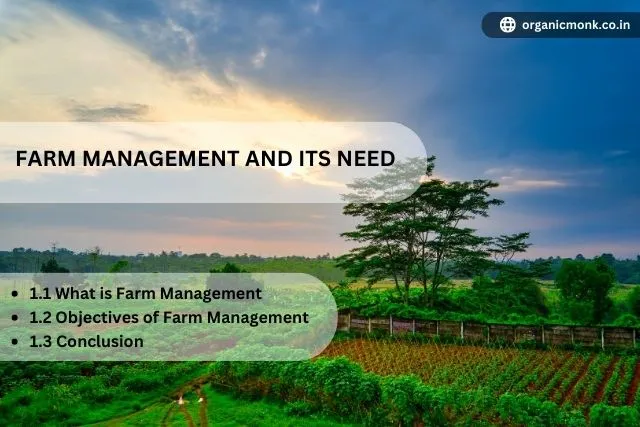What is Farm Management
A farm is an area of land dedicated to raising crops and food production or for pasture. Farm management is a method of organizing or managing a farm to yield maximum returns from the farm. The management of a farm refers to the planning of ways and activities with the aim to yield the maximum possible results.
Farm management consists of carrying out optimistic decisions and activities regarding crops, livestock, aquaculture, agroforestry, etc. The farming-related activities are managed and redefined to maximize productivity and profits. It aims to convert farming into sustainable and productive farming by allocating resources.
Farm management is also defined as the science and art of decision-making. It deals with optimizing the use of resources in the farm to achieve the optimal functioning of systems in relation to achieving specified farming objectives.
It is basically a branch of Agriculture Economics that deals with the economics of farm units. The areas that it deals with are – Land organization, Planning Capital for farm production, and planning of all operations to achieve objectives of farm management.
Objectives of Farm Management
Farm management is an essential step of farming as it helps to understand the potential of the farmland. To achieve better and maximum production results, here are some Easy ways to improve farming productivity. Read further to know some of the important objectives of farm management that help you understand the need for farm management.
-
Factor Efficiency
One of the prior needs to analyze profits is to measure the efficiency of factors or resources. One must find the relative efficiency between farming inputs and outputs. This analysis provides the farmer with the best combination of resources and inputs for optimistic production. We can also understand different input levels that can bring change to the output level. So that we can determine the most profitable combination of input and output.
-
Analyse cost and profit
The farm management techniques related to the analysis of cost and profit provide the per-hectare cost and profit of land. It is necessary to evaluate the per hectare and per quintal cost. The evaluation opens opportunities to analyze the growth and helps to make a better decision.
-
Evaluate Resources
Evaluation of resources such as land, water, labor, machines, plants, animals, and other renewable resources is helpful to plan their execution in an efficient manner. So, that the resources will give their optimized and maximum results. The relative performance of the machines in various farm operations needs to be evaluated.
-
Protect Diversity
Along with the aim to plan for increasing production, there is a need to protect diversity. Integrity and safety towards diversity are beneficial for the environment and for growth too. Soil management, pollution control, crop protection, water management, energy efficiency, nature conservation, and livestock management are some measures that should be advocated to evaluate the sustainability and operations of farm resources.
-
Better decision
Farm management creates a better decision-making position for decision-makers because it provides various information, tools, data, and engagements. It also helps to figure out the maximum efficiency and profitability of the farm. Managing farms prepares you for the risks and uncertainties and helps you understand the most profitable cultivation and livestock methods.
Conclusion
Given the objectives of farm management, we can conclude that it is an evident requirement of the farms. Farm management needs to obtain effective results at a lower cost. It offers the farm to yield better with the optimum use of resources. Managing the farms creates an organized system that aims to provide productive, sustainable, and profitable development.


I love how the article highlights the need to protect diversity while maximizing output. It’s a reminder that sustainable farming practices are essential for long-term growth.